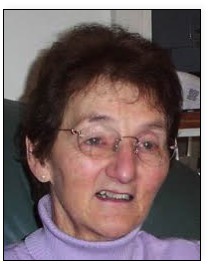
Kay Fyne
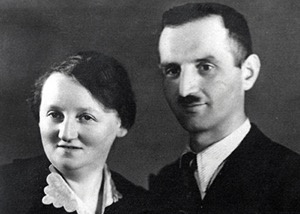
Parents, Gretel & Hugo Klein
In 1933 they first noticed that things getting bad for Jews. They weren’t allowed to go to certain shops. Kay had a music teacher who taught the violin and she wasn’t allowed to go to their shop. There was a swimming pool being built outside Badneustadt, the Jewish children knew that they wouldn’t be allowed to swim there because they were Jewish.
The Jewish children soon discovered that there was only one school for them with one class with all the age groups together. Kay was still allowed to go to the synagogue however and at first they weren’t bothered there. This changed on November 9 1938 Kristallnacht (‘the night of broken glass’) when synagogues and Jewish shops all over Germany were burned down. Kay remembers it clearly:
“We were in the synagogue and everyone told us to get out. We decided to go to the school so we ran out taking the Torah scrolls with us. There were people outside the school and they were jeering at us. We were terribly frightened but we had services in school after that.”
That same evening Kay witnessed something else on the way home. She recalls a disturbance on a street corner, Jewish men were being herded into a bus, there was a lot of jeering. She heard that they were taken to Dachau concentration camp. Her father was later arrested after sending a parcel to friends which contained mementos of his mother (Kay’s grandmother) who had died. He was sent to prison for sending a parcel! When he came out of prison times were hard but they managed to carry on. Kaye’s mother used to make cakes and went to the local baker where he baked them for her. One day he told Kay’s mother that she couldn’t use the baker any more. Kay remembers being so scared of the Nazis to the extent that one day when a friend fell off his bike she ran home because she thought they would be arrested just for falling off their bikes.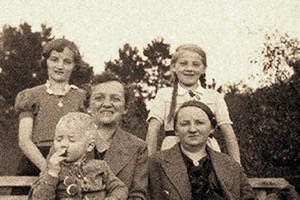
Kay Fyne, far left, pictured with her mother Gretel Klein, bottom right, her aunt Selma, bottom left, holding her brother Walter and her sister Hanna, top right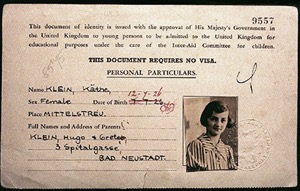 Kay Fyne's Kindertransport documentation
Kay Fyne's Kindertransport documentation
Kay’s parents decided to send the children to England on what became known as the Kindertransport. They were sponsored by a Mr Baron who agreed to pay their expenses All five children went including the baby brother who was only three years old.
The children were taken to Frankfurt and put on a train. Kay was 13years old, Hannah 12, Ludwig 14 and Sigbert 15. On arrival in England the four oldest children went to a boarding school in Hazlemere in Surrey where they stayed for three years. For the first year Kay lessons like everybody else but after that she became a household girl doing the cleaning, washing and cooking.
Kay remembers going to the post office waiting for letters from her parents. The Red Cross organised these letters. Kay’s parents were allowed to write letters with 25 words and then the children wrote letters with 25 words back on the same piece of paper, so she doesn’t even have those letters to remind her of them. In 1942 the letters stopped. Their father’s last letter told them that his friend was coming to pick them up, so the children knew that this meant they were going to be deported.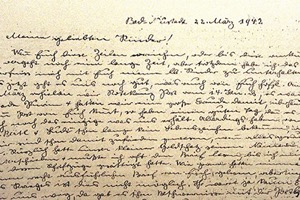
A letter sent to Kay Fyne from her parents Gretel and Hugo. 1942
Kay’s guarantor, Mr Baron, paid for her to go to dressmaking and design school in London. During this time Kay lived with a family. While she was there the father died and soon after the son went missing in the war. It was then that the mother started being hostile towards Kay complaining about “the Germans”. Kay started to get worried so Mr Baron sent her to a Jewish girls hostel in North London.
By the end of the war in 1945, Kay and her brothers and sisters still had heard nothing from their parents. She used to ask her brother what he thought had happened to them and he told her to be prepared never to see them again. What actually happened was that he went back to their home town in Germany after the war and found papers and letter belonging to their parents. There were letters that had never been sent to the children, which described their parents lives after the children had gone. How they managed to scrape together a living, their father having to sell his car and bike. There was even a letter telling them how to behave in the rest of our lives.
Her mother wrote: “What will happen to us we will entrust to dear God. Should we not see each other again in this life, I will say goodbye to my beloved children. Become good respectable people as your parents were, so that we can rest in peace in our graves.
“Pray for us and remember us and tell your children how we were tormented to death. The dear God protect you and guard you. I embrace and kiss you fervently. Look well after dear little Walter. Until we meet again in the hereafter. Your always sad and never forgetting you and now so unhappy Mama.”
Her father wrote: “I will thank the dear God that He has protected you until now from all harm and will guard you in the future. Should we have to die, then so be it and I ask of you to pray for us every day. Become good persons. The dear God protect you, my best and most beloved children who have had to leave us so soon. I kiss you many times and when I die I will have your pictures in my hand and will take them to the grave. Goodbye, I cannot write any more, my heart is bleeding, Papa.”
Kay spent the war years in Surrey but later, after first moving to Kent, settled in Liverpool.
She recalls: “My father heard Britain was accepting 10,000 unaccompanied children under the Kindertransport system. I am very grateful to Britain, it was the only country which would
take us.”
Kay Fyne, formerly Klein, is a retired nurse and lives in Mossley Hill, Liverpool.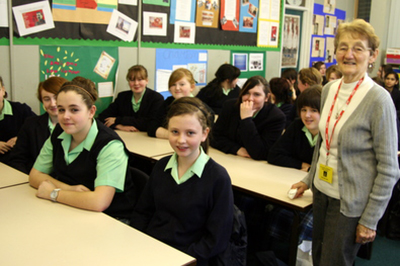
Kay Fyne talking to pupils of St. Julie's Catholic High School
Sources:
http://www.annefrankguide.net/en-gb/bronnenbank.asp?aid=37805
http://www.liverpoolecho.co.uk/news/liverpool-news/poignant-tales-child-refugees-saved-6182388
• All sources for subject Memories:
• Paul Oppenheimer
• Regina Franks (née Sherer)
• Kay Fyne (née Clein)